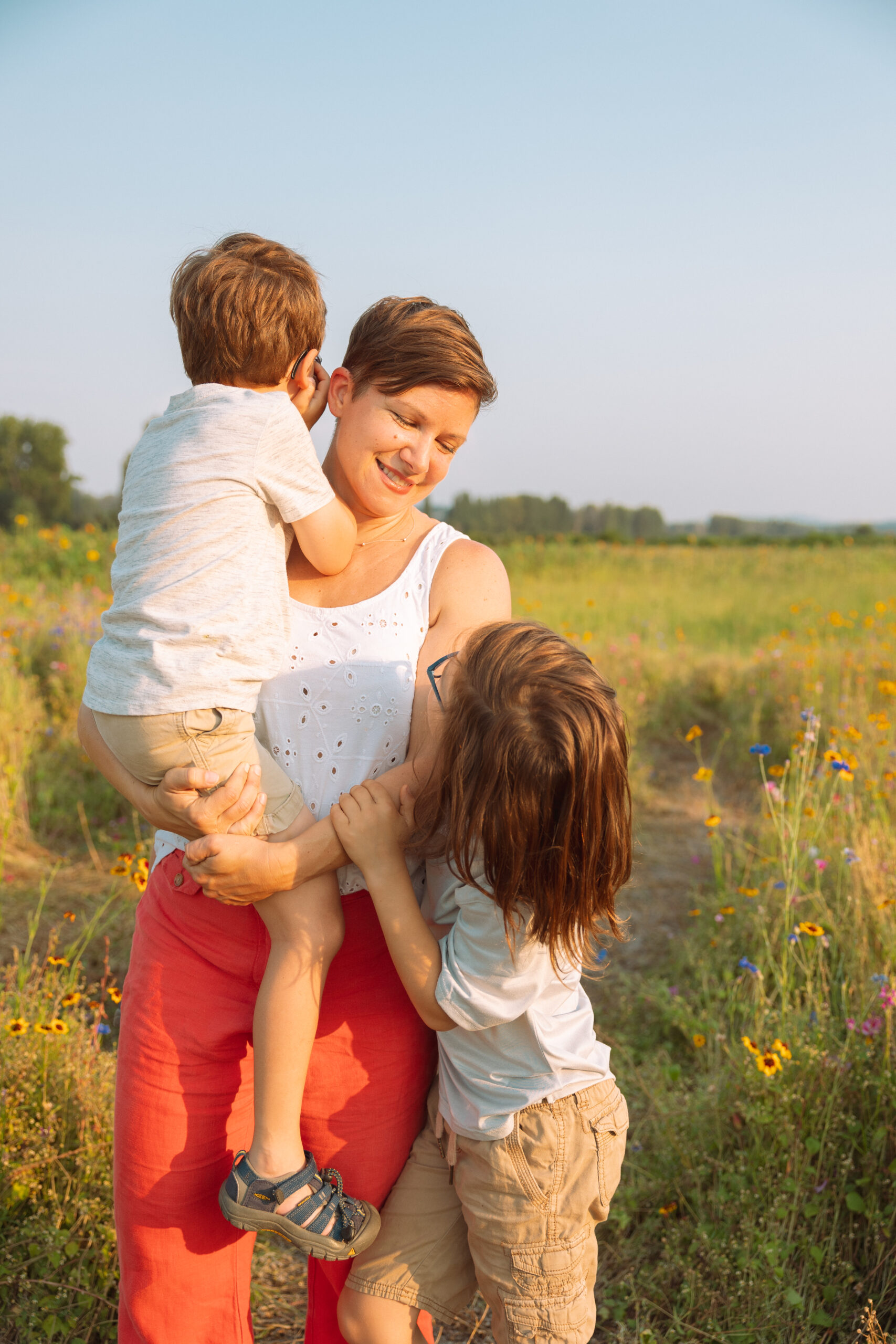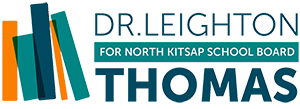An Interview with Leighton
Ballots go out October 17 and must be returned or postmarked by 8pm on November 4, 2025.
Here are some helpful links for more information:
In North Kitsap, school board members represent the community as one of five ‘Directors’. I am running to represent District 1.
The Board works together to:
- Hire, supervise and evaluate the superintendent
- Set the vision, mission and strategic goals for the district
- Review, revise and adopt policies
- Establish and oversee the budget
- Serve as community representatives
- Monitor the district’s progress towards its goals
One way to think about it is this: school boards set the “what” and District leadership and staff figure out the “how”. You can read more details about what a school board member does here.
I’m not! But I’m here to stay. I have been fortunate to live all over the world as a military spouse but from the moment I landed in Washington in March of 2020, I knew this place would be my forever home. We bought a house in Poulsbo and my days of moving due to the military are over. I can’t imagine a place I’d rather live.
Thank you for your interest! There are many ways to help out. Want to knock on doors? Help me write thank-you cards? Host a gathering with your friends?
Please sign up to volunteer in a way that works for you. Feel free to send me an email leighton4nksd@gmail.com.
All event details are shared on our website and social media.
If elected, I will bring commitment, broad experience and expertise, and a spirit of curiosity to the North Kitsap School Board. I care deeply about kids and have spent my career—and my free time—working to support them, whether through teaching, coaching youth running groups, or serving on local boards.
I began my career in human capital strategy, helping organizations design policies and systems to meet their current and future workforce needs. In 2009, I transitioned to public education and became a classroom teacher. Since then, I’ve served in roles across the education system, including state-level leadership. I understand the complexities of public schools from multiple perspectives—and I bring empathy because I’ve lived those challenges.
I also bring academic expertise: I hold a doctorate in education policy and leadership and a master’s degree in curriculum and instruction. I’ve spent years both working in and alongside schools and studying how to make them better.
But just as important as my experience is my mindset: I approach this work with curiosity and a commitment to listening. I believe in asking hard questions, engaging the community, and making decisions grounded in what’s best for all of our students.
I’m motivated to serve because I believe North Kitsap Schools should be every family’s first choice when choosing where to send their children to school. I have young children and plan to be part of this community for the long term. When I ask, “Where can I help?”—the answer is always kids and schools. When I learned my district seat was open, it felt like a call to action.
I’m deeply motivated to strengthen trust between the community and our school board. I’ve heard a consistent message: people want more transparency and more opportunities to be heard. I’m a connector by nature. If elected, I’ll host monthly listening sessions and stay rooted in community conversations as we shape the future of our schools, together.
My experience has prepared me for this role by giving me both a deep understanding of public education and a broad view of how systems can better serve students. I started my career in human capital strategy, helping organizations plan for their future workforce. These skills translate directly to thoughtful, long-term planning for our schools. In 2009, I became a classroom teacher and have since worked across the education system, including state-level leadership. These roles help me see issues from many perspectives: teachers, families, and students. I am a parent to two elementary-aged kids, which keeps me grounded in what our decisions mean for children and families every day. With a doctorate in education leadership and policy and a master’s in curriculum and instruction, I bring both practical experience and research-based insight, along with a commitment to listening, asking good questions, and making decisions centered on what’s best for all students.
We have space for improvement in a number of areas, but continued loss of funding due to declining enrollment is one issue that impacts our ability to make these changes. Our district is facing declining enrollment, and not just due to housing costs or birth rates. We need to stay curious about why some families are choosing other districts or leaving public education altogether. In the ’24/’25 school year, 577 students opted out of North Kitsap for other districts – that represents over 10% of our student body! This trend has major implications for our funding, staffing, and long-term planning. Every student who leaves takes resources with them—but every student we bring back brings funding, energy, and opportunity.
We need to ask: Why are families leaving/choosing other districts? What do they need to stay? The answers should shape how we respond. That means listening closely to students and educators, and taking meaningful action—both within our existing structures and through creative new options. That might mean expanding CTE programs or offering flexible, part-time options for current homeschooling families. We should be looking at models that work in other districts, and exploring how to make them work for us too.
North Kitsap has incredible strengths: excellent educators, stable finances, and an invested community. We are small enough to be nimble and bold enough to lead with innovation. I want to help build a future where families are proud to choose North Kitsap—and excited to stay.
As voters look ahead to the general election, I hope they’ll consider both depth and breadth of experience. My background as a classroom teacher gives me firsthand understanding of what students and educators need to thrive, but my work with schools extends far beyond the classroom. Over the past 15 years, I’ve served in roles supporting public education at multiple levels, including as Chief Strategy Officer for the Wyoming Department of Education, where I worked with legislators, the state board, and local tribes to guide policy, shape statewide strategy, and strengthen support for school districts.
Before becoming an educator, I worked in business, specializing in strategic workforce planning, helping organizations anticipate change and align their policies and practices for long-term success. That experience taught me how to approach complex systems with data-informed strategy, collaboration, and a focus on the future.
Today, I bring those same skills to North Kitsap. I stay current on legislation, research, and funding opportunities. I am actively building relationships with local and state leaders, community partners, and families. That’s what it takes to ensure our schools serve students first and reflect the priorities of our community.
As a parent of two elementary-aged children, my investment is both professional and personal. I understand the realities our families face and the importance of long-term planning. This election isn’t just about school experience and passion for schools; it is also about steady leadership, the ability to bring people together, and the know-how to turn vision into action for North Kitsap’s students.
Washington’s current funding model leans heavily on local levies to bridge gaps in staffing, programs, and maintenance needs that arguably should be met through stable, statewide funding. The state has a constitutional duty to amply fund basic education, and that responsibility should not fall disproportionately on local communities whose property values vary widely.
At the same time, local levies give our district the flexibility to, ideally, meet community priorities like arts, athletics, and advanced learning that may go beyond the state’s definition of “basic.” I don’t believe our goal should be to eliminate local funding, but rather ensure it supplements, not substitutes for, what the state is constitutionally bound to provide.
We should be working closely with our elected officials and the Office of Superintendent of Public Instruction (OSPI) to advocate for our needs and ensure that we are maximizing all available funding sources. The state offers additional funding streams such as the State Construction Assistance Program (SCAP) funds and targeted grants designed to support district-specific needs above and beyond the basic funding formula. We owe it to local taxpayers to seek out and apply for these programs whenever possible.
A balanced path forward means purposeful advocacy with our legislators, responsible long-term planning, strong partnerships with state leaders, and a commitment to using every available tool to optimize funding and to ensure that our funding is equitable and sustainable. Our taxpayers and our students deserve a system that works smarter, not just one that only asks for more.
When North Kitsap considers a new bond, the top priority must be rebuilding community trust. The last bond’s failure made clear that we need a more collaborative, transparent process, one that actively involves families, staff, and community members from the start. Voters need clarity about what’s being proposed, why it’s needed, and how funds will be managed and monitored over time.
A successful bond must reflect shared priorities: safe and modern learning environments, equitable investments, and thoughtful long-term planning that reduces the need for piecemeal, levy-to-levy fixes in the future. That means taking time to communicate clearly about facility conditions, enrollment trends, and cost trade-offs, so that every stakeholder can see how the plan supports both today’s students and future generations.
Our next bond effort must be rooted in transparency, accountability, and genuine community partnership. I think when people feel heard and see responsible stewardship, they will be far more likely to support investments in our schools’ future.
View Leighton’s Interview with the League of Women Voters:

